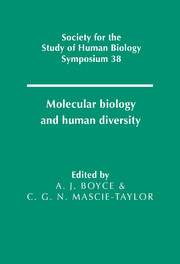Book contents
- Frontmatter
- Contents
- List of contributors
- Preface
- 1 Mitochondrial DNA in ancient and modern humans
- 2 Digital DNA typing of human paternal lineages
- 3 Minisatellites as tools for population genetic analysis
- 4 DNA fingerprinting: development of a technology and its application to the study of human populations
- 5 Kinship, inbreeding, and matching probabilities
- 6 Using the coalescent to interpret gene trees
- 7 Some attempts at measuring natural selection by malaria
- 8 AIDA: Geographical patterns of DNA diversity investigated by autocorrelation statistics
- 9 Mitochondrial DNA sequences in Europe: an insight into population history
- 10 Palaeolithic and neolithic contributions to the European mitochondrial gene pool
- 11 The molecular diversity of the Niokholo Mandenkalu from Eastern Senegal: an insight into West Africa genetic history
- 12 The peopling of Madagascar
- 13 Molecular perspectives on the colonisation of the Pacific
- 14 Population ancestry on Tristan da Cunha–the evidence of the individual
- 15 Linguistic divergence and genetic evolution: a molecular perspective from the New World
- 16 Allelic sequence diversity at the human β-globin locus
- 17 A nuclear perspective on human evolution
- 18 Contrasting gene trees and population trees of the evolution of modern humans
- 19 Methods and models for understanding human diversity
- Index
13 - Molecular perspectives on the colonisation of the Pacific
Published online by Cambridge University Press: 19 September 2009
- Frontmatter
- Contents
- List of contributors
- Preface
- 1 Mitochondrial DNA in ancient and modern humans
- 2 Digital DNA typing of human paternal lineages
- 3 Minisatellites as tools for population genetic analysis
- 4 DNA fingerprinting: development of a technology and its application to the study of human populations
- 5 Kinship, inbreeding, and matching probabilities
- 6 Using the coalescent to interpret gene trees
- 7 Some attempts at measuring natural selection by malaria
- 8 AIDA: Geographical patterns of DNA diversity investigated by autocorrelation statistics
- 9 Mitochondrial DNA sequences in Europe: an insight into population history
- 10 Palaeolithic and neolithic contributions to the European mitochondrial gene pool
- 11 The molecular diversity of the Niokholo Mandenkalu from Eastern Senegal: an insight into West Africa genetic history
- 12 The peopling of Madagascar
- 13 Molecular perspectives on the colonisation of the Pacific
- 14 Population ancestry on Tristan da Cunha–the evidence of the individual
- 15 Linguistic divergence and genetic evolution: a molecular perspective from the New World
- 16 Allelic sequence diversity at the human β-globin locus
- 17 A nuclear perspective on human evolution
- 18 Contrasting gene trees and population trees of the evolution of modern humans
- 19 Methods and models for understanding human diversity
- Index
Summary
Introduction
Human biologists interested in population diversity have long been receptive to the potentials offered by newly developed techniques of biological analysis. As a consequence, the populations of the world have been characterized using a variety of systems including morphological, anthropometric, dermatoglyphic, antigenic and electrophoretic characters.
In recent years, analysis of nucleotide sequence variation has added another layer of detail to the body of information available. The particular merit of molecular genetic data, if one is interested in the characterization of the fundamentals of human genetic diversity, is that it directly describes variation at the level of the genotype: all of the systems listed previously describe characteristics that are essentially phenotypic. Although it is often possible to take environmental effects into account in the analysis of such characters, the underlying genetic diversity may be masked. Even when protein sequence data are used, not all of the underlying DNA sequence variation is detected, owing to the redundancy of the genetic code.
This does not mean that the existing body of non-genetic information must be discarded, or that earlier conclusions based on such data are inaccurate. The application of serological and protein electrophoretic techniques to the study of human variation has revealed facets not visible before.
- Type
- Chapter
- Information
- Molecular Biology and Human Diversity , pp. 171 - 195Publisher: Cambridge University PressPrint publication year: 1996
- 3
- Cited by



